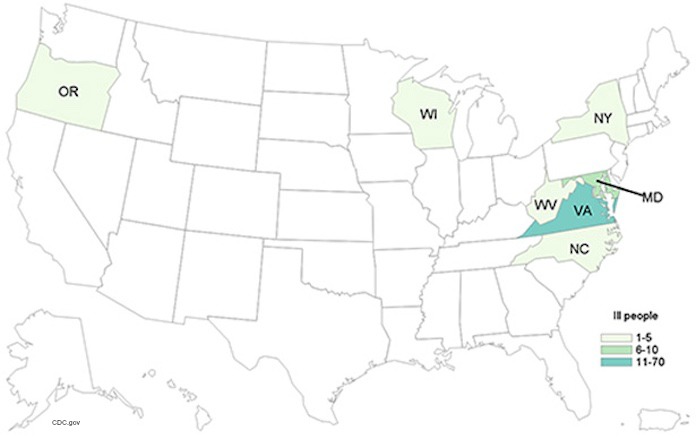The Centers for Disease Control and Prevention has updated the number of those sickened in the hepatitis A outbreak linked to imported frozen strawberries sold at Tropical Smoothie Cafes in Virginia. Now, 89 people have been reported sickened in seven states.

The case count by state is: Maryland (10), New York (1), North Carolina (1), Oregon (1), Virginia (70), West Virginia (5), and Wisconsin (1). Thirty-nine of those sickened have been hospitalized, and no deaths have been reported.
Epidemiologic and traceback evidence indicates that frozen strawberries imported from Egypt are the likely source of this outbreak. Almost all of the ill persons interviewed in this investigation reported drinking smoothies made with strawberries at Tropical Smoothie Cafe locations before August 8, 2016. The Cafes are in Maryland, North Carolina, Virginia, and West Virginia.
Since Tropical Smoothie Cafe removed the Egyptian frozen berries from their restaurants in those states on August 8, 2016, there is no ongoing risk of acquiring the infection at those venues. Out of an abundance of caution, Tropical Smoothie Cafe has switched to another strawberry supplier for all of their facilities nationwide.
If you think that you have gotten sick from drinking a smoothie made with frozen strawberries at Tropical Smoothie Cafes in the states mentioned above before August 8, 2016, see your doctor. If you have had hepatitis A in the past or have been vaccinated against the virus, you are immune.
The hospitalization rate in this outbreak remains high at 43.8%. The typical hospitalization rate for a hepatitis A outbreak is about 20%. Factors that make a patient more likely to be hospitalized include advanced age, an underlying health condition, or liver disease. The age range in this outbreak in Virginia, at least, is 14 to 68. We don’t know how many people are over age 65.
The CDC states that they are not yet aware of other restaurants that may have received those Egyptian strawberries linked to this outbreak. Hepatitis A is more common in developing countries. Doctors advise that anyone traveling to Egypt be vaccinated against the hepatitis A virus.
The symptoms of hepatitis A include jaundice (yellowing of the eyes and skin), fatigue, weight loss, loss of appetite, clay colored stools, dark urine, and fever. Symptoms usually begin 15 to 50 days after exposure to the virus. Most people get better on their own, but if a patient becomes dehydrated they may need to be hospitalized. In rare cases, a hepatitis A infection can lead to acute liver failure.
To help prevent the spread of this illness, if you are sick, especially with the symptoms of hepatitis A, stay home from work and school. Wash your hands well after using the bathroom, changing diapers, or taking care of someone who is sick. Always wash your hands with soap and water before preparing food and beverages for or serving food or beverages to anyone. If you think you may have been exposed to the virus, be especially vigilant about washing your hands, because the virus is transmitted by the fecal-oral route. People are contagious for two weeks before any symptoms appear.




